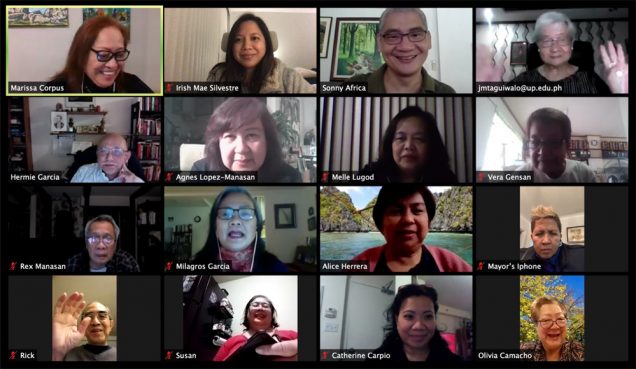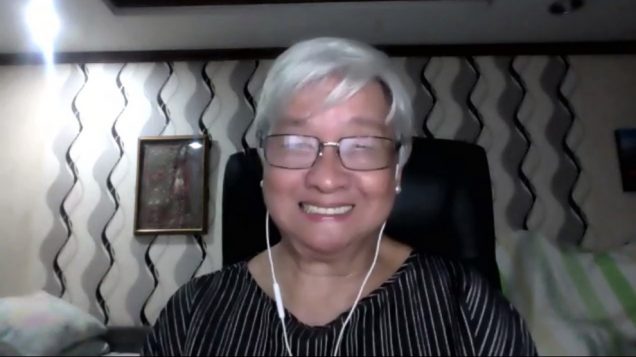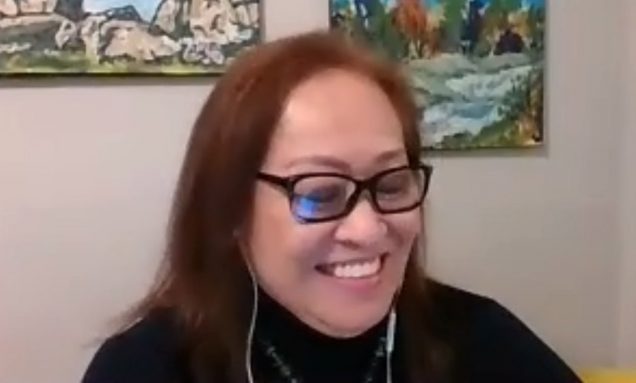On Poverty, Hunger and Ayuda
On Poverty, Hunger and Ayuda

Speakers and participants at the October 30 event
Malaya Webinar: Philippines under pandemic
By Irish Mae Silvestre
The Philippine Repporter
Canada might be riding it’s second wave of COVID-19 infections, but many Filipinos believe that the Philippines is still very much on its first wave. With daily infection rates soaring in the thousands the spotlight is on the Duterte administration and how its approach has resulted in the current situation.
This issue of government response and corruption comes into focus during the October 30 webinar ‘Poverty, Hunger at Ayuda in the time of Philippine COVID’ presented by the Malaya Movement Toronto and the Filipino Canadian Writers and Journalists Network (FCWJNet).
Speaker Judy M. Taguiwalo is a professor at the University of the Philippines and the former secretary of the Department of Social Welfare and Development under the Duterte administration. Meanwhile, speaker Sonny Africa is the executive director of Ibon foundation, a Philippines-based advocacy and research institution.
Along with moderator Marissa Corpus from Malaya Movement, Taguiwalo and Africa discuss how the deep-seated corruption has created the perfect storm. (Responses edited for clarity)

Judy Taguiwalo, former Secretary, DSWD
On government assistance
Taguiwalo: Even before the pandemic perceived poverty was already very high. As early as April, many Filipinos feared death more from hunger than Coronavirus. But government cash assistance of $100 to $160 were clearly not enough for households without sources of income because of the strict lockdown. The amount was too little, the distribution was to slow.
Africa: To drive home the point that the Duterte administration is clearly not for the people: as Judy talked about the poor COVID response, that doesn’t make sense. [The government] will spend 1.1 trillion pesos on infrastructure but for the sick, hungry and those in need of help you can’t give them anything?
On poor government response to the pandemic
Taguiwalo: They allowed locally stranded individuals to go home without testing them. They didn’t want to hold them in Manila because they’d have to feed them. So all these provinces like Batanes or Leyte that didn’t have cases got COVID. It’s really the government’s inability to address COVID as a health issue. They used militaristic solutions – lockdowns, imprisoning those not wearing face masks – that contributed to the continuing increase of cases. We’re still on our first wave; we haven’t had a breathing spell, but the economy is opening up.

Sonny Africa, Executive Director, IBON Research
(Photo: Rappler)
Africa: By not counting the number of COVID cases, you really can’t control it. I’d like to highlight that while cases have slowed down, [the numbers that are] accelerating are in Visayas and Mindanao.
On corruption and the Philippines growing economy
Taguiwalo: There’s indirect corruption like land speculation where you have internal information on the “Build Build Build” program. I was still in Malacanang when this unfolded. I raised this issue of land speculation, I said, “People will know where these are going to be built.” They said, “No, it’s okay we’ll take care of that.” They’re really taking care of that. Another issue is the statement of assets and liabilities of the president’s statements and his bank account: how can we talk about transparency if they president won’t talk about how much money he has prior to being president and four years into his presidency?
Africa: To this day, according to UNICEF and DOH data, about 95 to 100 children die every day from malnutrition. It’s no mystery that we have rapid economic growth while many are unemployed and starving. It’s because someone benefits from our economy. [Here’s] a sad trivia: did you know that the combined wealth of the twenty richest Filipinos is $69 billion, about 3.6 trillion pesos? That’s more than the combined wealth of the poorest 62 million Filipinos.

Marissa Corpus, moderator
On the possibility of a progressive government
Africa: Someone like Vico Sotto didn’t fall from the sky. It’s because he has links to organized urban poor groups and trade unions. His progressive nature may be because he also studied and his sincerity to help in public service – he has that spirit. But [the reason we have] someone like Vico Sotto is because there are organized groups around him. Ultimately, if we’re going to change for a more progressive level in the Philippines, it won’t come from the top but from the base.
On how Filipino-Canadians can help
Taguiwalo: For now, the major issue is human rights. How do we expose the human rights violations, such as the war against activists and support political prisoners?
Africa: The Philippine government gives disproportionate support to migrants. The government is scared and listening to immigrants. The way Filipino-Canadians speak is different: the louder they speak, the more they’ll hear them. I hope they embrace that power and continue to speak out not just on webinars but by writing to government officials and organizing activities covered in the media. The government is scared when people organize themselves. Immigrants have a special power over Philippine politics.
Comments (0)